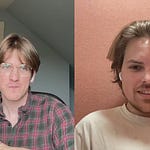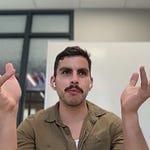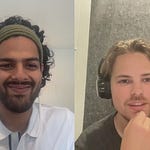In this episode, I sit down with Logan, a master's student studying public administration who's grappling with a classic entrepreneurial dilemma: he has big ideas for improving systems and organizations, but struggles to bridge the gap between abstract vision and concrete implementation.
Transcript
This transcript is AI-generated and may contain mistakes.
Andrew (00:01): Welcome to another episode of the Unblocked Podcast. Today we have Logan. Would love for you to introduce yourself and tell me what you're feeling stuck on.
Logan (00:14): My name is Logan. I'm from Southern California, now living on the Central Coast. My background is varied - I've been a soldier, linguist, missionary, and often find myself as either the tactical person in non-technical groups or the non-technical person in technical groups.
Currently I'm studying a master's in public administration at the Middlebury Institute in Monterey. The program focuses on how systems work traditionally and how they could work differently - cutting edge research on getting the right people together at the right times to solve problems.
Where I'm stuck is finding the balance between working within a system versus going outside it, and going from abstract ideas to concrete action. I end up overthinking, overanalyzing, and overplanning without actually doing something concrete that generates value and income.
Andrew (01:46): How much financial runway do you have?
Logan (02:14): Under normal conditions, I have one more semester paid by the GI Bill - about five or six months. I could take another semester for more runway, then I have about three months of savings. So somewhere around six months to a year total.
Andrew (02:47): Do you have any capital or debts?
Logan (02:50): I have enough in the S&P 500 to cover my student loans. No house, essentially no capital and no debts.
Andrew (03:01): Are there goals other than building wealth that finance is blocking?
Logan (03:16): I want to be autonomous with my time to do meaningful work. Ideally, I'd find a job that makes money while contributing to complex societal problems. But often what needs to happen to address those problems isn't what people think is meaningful or valuable. You get high funding for low-impact areas and little funding for high-impact areas. Making the case for funding something that doesn't seem useful but actually is important - that's the dilemma I face.
Andrew (04:23): I notice some assumptions there. You said low-impact areas get high funding and high-impact areas get low funding. But the world couldn't work that way - once high-impact areas are discovered by funders, you can leverage that impact for value creation and more money. Areas with high impact also have high funding - AI development, military defense, for example.
Logan (05:05): That's interesting. I'm trying to work on human alignment - how you get humans aligned properly to avoid bad outcomes. There should be analogous funding to AI alignment, and there is some. But rather than looking at incremental steps, I ask: how would we build something from scratch with everything we have now? How is that different from what we have? How can those differences inform useful changes?
I haven't applied for grants mostly because I haven't been able to make a succinct pitch that fits their forms. But I'm getting closer every day.
Andrew (06:19): Let me offer you a frame - identify this as entrepreneurship. You have an entrepreneurial desire. The entrepreneur's job is to notice underfunded areas and capitalize on those opportunities. There are social entrepreneurs, cultural entrepreneurs, nonprofit entrepreneurs. It sounds like you want the opportunity to do entrepreneurship in an area you care about.
Logan (07:19): I really like intrapreneurship - being within a broader organization but having freedom to do mini bits of entrepreneurship to keep it aligned with its original purpose. That's where I've been successful and felt fulfilled.
Andrew (08:11): Can you name some of those roles?
Logan (08:15): The biggest was as an information analyst for Customs and Border Protection while deployed as a soldier. I learned to automate processes using Power Query and other tools. Once those processes were faster, I had extra time to revamp their reporting system - instead of PowerPoint with flat charts, I built interactive dashboards that conveyed information more quickly and in real time.
It was so successful that senior executives came from DC to see what we were doing, and they applied our approach across the rest of the system.
Andrew (09:27): How long was the project?
Logan (09:31): Twelve months total. First three months getting my bearings, next three figuring out baseline requirements, then three months designing the solution, and final three months scaling it.
Andrew (09:42): That sounds like management consulting. Have you considered that?
Logan (10:09): I have, but I think the business model is problematic. Consultants usually get paid hourly, so the more they do, the more they get paid. But good management consulting should figure out the minimum work that has maximum impact. The incentives seem cross purposes.
Andrew (10:45): What do you think you should do?
Logan (11:00): Build relationships with people who do consulting and people who need consulting. Understand what consultants do that's necessary versus what isn't, and what's helpful for clients. Use that to see if my idea for a different business model is worthwhile and practical.
Andrew (11:28): What do you want to do after graduating?
Logan (11:41): I'd like to be someone people go to when they have problems they can't solve - to give advice, think through issues, take cognitive load off their plate, and bring back useful options. It's like what military intelligence does in a defense context, but applied to broader society.
Andrew (12:33): That's too high a level of abstraction to be implemented. Do you have something implementable?
Logan (12:54): I could apply to a management consulting firm and work within an existing structure.
Andrew (13:02): That's much more applicable. Is part of what's difficult that you have projects at unimplementable levels of abstraction, with ambiguous in-between steps?
Logan (13:30): Yes, it's the middle. I could probably be a management consultant, but what happens is it's great for the first year or two. Then I realize problems and there's no way to channel that back into fixing what I see. I don't have enough runway or clear ideas about what I'd do on my own, so I end up leaving and trying to find something else. I have this trail of places that could have been great careers if I'd continued them.
Andrew (15:19): One analogy I like: sometimes people look at Lady Gaga and think "If I was doing the Super Bowl concert, I would have done it this way." Maybe that's a good idea, but you aren't Lady Gaga. You have different affordances. You can't do better at the Super Bowl without being invited, and to be invited, you have to become famous through doing parking lot concerts and crazy stunts for years.
The pattern is people try to remix other people's fame rather than remixing how they got started. You can follow Lady Gaga's path to fame, but you can't remix the end result.
Logan (17:43): So the strategy these people take at the beginning - trying different things until one fits, doing experiments - that's more key?
Andrew (17:44): What I'm saying is for entrepreneurs, a common mistake is imagining the end goal. You can't start there. The final product isn't what you sell initially. If you're trying to remix something, you don't know if anyone wants your version. You don't even know if anyone wants the original.
Look at heroes who have done what you want to do, but look at their first steps, not their end products.
Logan (21:33): The other issue is I either focus on tons of things or very intensely on one thing. To focus on the one thing that will be successful in 10 years while doing something else to pay bills - that's hard. Balancing what I need to do to live with what I want to do long-term is another tension point.
Andrew (22:20): How capable are you of delivering marketable skills in employment roles?
Logan (22:45): If I had three to six months runway to learn new skills, I'm confident I could do most anything teachable in that timeframe.
Andrew (23:08): Do you tend to overperform in roles?
Logan (23:35): Yes, I usually end up in the top 1-10% depending on the skill. Earlier I was more about hard work; now I'm more selective about what deserves my time and effort.
Andrew (23:42): What if you just tried really hard to make a lot of money? Money buys freedom, vacation, rest, entrepreneurship, employees, the ability to raise money. If making money became your goal, knowing it would help all your other goals?
Logan (24:23): I think I might be over-correcting. I have one project idea that would be really cool, but to build it I'd need to hire someone since I know enough computer science to write good documentation but not to code it myself.
Andrew (25:17): I was thinking the opposite. Building a successful company takes about seven years for most people. I'd suggest getting a really good job that pays well, then using that money for your entrepreneurship years.
If you want to be independent but don't know how to make money selling your services or products, you should give yourself at least two years of runway - ideally three years. That gives you time to try selling services, fail, try again, take breaks, make friends, go to parties. There are many experiments the average person needs to make.
If you don't have two years, I'd have the mental model that you don't have enough time to do entrepreneurship. It's like wanting a bachelor's degree in three months - it's just not what that is.
Andrew (29:02): Let's say you were selling a consulting package for $25,000 where you'd advise somebody on a tough problem. Who would you go after in your contact book?
Logan (29:30): I'd go through my school's alumni network to find people at organizations that fit the buyer profile. I'd chat with them about whether they're having the problems I think they are, then find the right person in their organization to pitch the service to.
Andrew (30:22): When you're running an organization, when do you say yes to someone offering $25,000 in consulting?
Logan (30:50): When it's necessary and doing it myself or internally would cost more than the service price. A lot of it involves things people don't consider important but actually are crucial long-term. The value is showing how paying attention to these things could provide value or prevent costs, rather than trying to reorganize internally to address it.
Andrew (31:15): Would it be more fun to do this over and over with new teams, building new relationships and management styles? Or would you prefer having a trusted team you work with for years, building intense relationships while still doing strategy and operations work?
Logan (32:04): My stated preference would be the latter - having those long-term relationships. But my revealed preference has been the former, being dropped into places and making friends there. That's how most of my experience has played out.
Andrew (32:24): Is that because you wanted it that way?
Logan (32:31): No, mostly because of structure. Almost everything I've done has been temporary - two to three years at a time. But now that I'm older and want to settle down, having that tribe is a bigger priority. I'm feeling the lack of it.
Andrew (32:51): Where do you feel the psychological blocks around focusing on too many things versus one thing are coming from?
Logan (33:22): Partly because I'm interested in many things, but also from lack of confidence that what I'm focusing on now is the right thing. So I hedge - if this isn't right, I try to find other places to switch to. But I understand that constant hedging means I'm not going far enough into something for it to bear fruit.
Andrew (33:58): Here's a quick summary: Logan, you're an overperformer who likes strategy and consistently learns to make systems better. But you're blocked because you have no clear pathway to utilize those skills and no environment that appreciates them.
The solution is finding an environment where you can practice those skills and they're appreciated. Any environment is better than being alone - any social or cultural environment that appreciates your skill set.
Logan (36:13): That's where I'm at. Finishing my program, I should probably look for jobs that fit what I'm trying to do. Maybe not super high paying right out of college, but something good in San Francisco, New York, Austin - places with scenes that benefit from what I do. I can look for jobs in all of them and see where one lands and feels right.
Andrew (37:08): Don't get too distracted between options. Do you journal?
Logan (37:34): I don't have a journaling practice, but I use Twitter and other places like a journal - expressing thoughts, questions, responding to things people say.
Andrew (37:38): Two things will help: First, proper journaling - just to yourself, not socially. When you journal, you're talking with yourself. If you talk to yourself out loud, you get into loops. On paper, you notice the loops and move on, getting through a lot quickly and reaching clarity.
Second, conversations like this with someone who can coach you - someone successful, stable, with good judgment who's brutally strategic.
You're considering many options right now and aren't sure. There isn't necessarily one correct option. You need another five to ten hours working through all these options, playing out every scenario. It's work - like writing a novel. You need to write out all your possible life stories based on where you are now, and be non-delusional about what's possible.
Laying out all those pathways will take many hours of discussion, but I think it would be really helpful.
Logan (40:18): That's great. It's funny you mention approaching it like a novel - for my research project, I've developed a framework that's like telling a story about how different things relate to each other. Many of the nodes are like characters in my life story going in different directions. I'm separating them out, understanding them as their own directions and getting clarity on those.
Andrew (40:56): Especially social conversations will help a lot. Try to have more conversations, and do that with yourself through journaling too.
Logan (41:25): This was very helpful. Thank you for the clarity and direction. There are a lot of seeds of thought that are going to grow into good directions.









